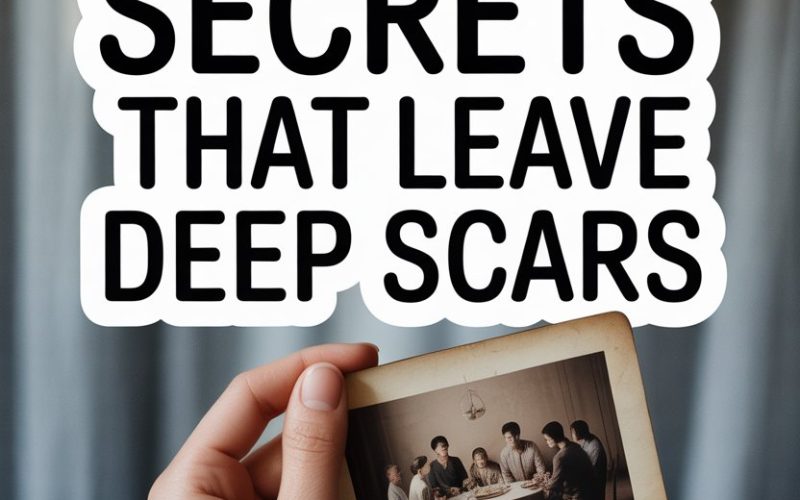Every family has its quirks—Aunt Janet’s mysterious “business trips”, Dad’s suspiciously well-stocked biscuit tin, or that “cousin” who looks a bit too much like Grandpa.
But some secrets don’t just make for awkward Christmas dinners. Some leave marks that linger long after the wrapping paper’s been binned.
If you’re a parent navigating the minefield of raising emotionally healthy, resilient kids (all while microwaving yesterday’s spaghetti), it helps to know what kinds of secrets do real damage, and more importantly, what you can do about them.
1. The “We Don’t Talk About That” Taboo
There’s a special hush that falls over a room when certain topics come up—addiction, mental health struggles, estranged relatives. Families sometimes decide it’s better to sweep these things under the rug “for the kids’ sake.”
The trouble is, children are top-notch detectives, and nothing screams “something’s wrong” like the collective panic to shut down a conversation.
Research from the American Psychological Association shows that secrecy around difficult issues often leads children to fill in the blanks with their own (often scarier) interpretations.
When a topic becomes off-limits, it can create anxiety, confusion, and a sneaky sense of shame. The unspoken rule is: “If we can’t talk about it, it must be bad. Maybe I’m bad for even wondering.”
If you’ve got a family secret festering in the corner, try breaking the silence in age-appropriate ways.
You don’t have to spill every detail of Uncle Ray’s wild youth, but you can acknowledge that some things are hard to talk about and reassure your child that their questions are always safe with you.
Keeping the lines open helps prevent the gnawing worry that the truth is unbearable.
2. Who’s Really Who? Hidden Parentage and Identity
Sometimes, family trees look more like brambles—half-siblings, adoptions, donor conception, surprise biological dads. Families often keep biological parentage under wraps, hoping to protect kids (or themselves) from pain.
But secrecy about identity tends to unravel, and when it does, the fallout can be huge.
A study published in the Journal of Child Psychology and Psychiatry found that discovering hidden parentage later in life correlates with higher rates of anxiety, depression, and trust issues.
Imagine growing up thinking you know who you are, only to learn at 23 that your dad isn’t your dad. It’s the kind of plot twist that makes telenovelas look tame.
Telling the truth, even when it’s complicated, helps kids build a secure sense of self.
If family history involves adoption, donor conception, or a “surprise sibling”, you don’t need to hold a press conference—just choose honest, loving words, delivered early and often.
Kids can handle more than we think, especially when they feel loved and supported.
3. Money Woes and the Great Pretend
Finances are one of the last great family taboos, right up there with Mum’s age and Dad’s dance moves. Many parents try to keep money struggles a secret, thinking they’re shielding their kids from stress.
But children are astonishingly perceptive when it comes to tension at home. They notice more than just whether Mummy’s hiding Asda own-brand cereal in a name-brand box.
A study from the University of Cambridge highlights that even young children pick up on financial stress, and secrecy only amps up their worries.
When kids sense something’s wrong but don’t know what, imaginations run wild (“Are we going to lose the house? Will we have to sell the dog?”).
Honest conversations about money—again, in child-friendly doses—build resilience.
You don’t need to give your six-year-old a rundown of the mortgage payments, but you can explain that sometimes adults have to make tough choices, and that things will be okay because you’re in it together.
Feeling included, rather than shut out, eases anxiety and teaches vital life skills about managing challenges.
4. Mental Health Issues Swept Under the Rug
Mental health stigma is alive and well in many families, sometimes disguised as “tough love” or “just get on with it.” When a parent, sibling, or even a child is struggling, it’s all too easy to default to silence.
But pretending everything’s fine can have the opposite effect.
Children often internalize family distress, blaming themselves for emotional upheaval they don’t understand.
According to the National Alliance on Mental Illness, secrecy around mental illness increases the risk that children will develop their own mental health problems, or be reluctant to ask for help when they need it.
The antidote? Openness and naming the elephant in the room. Even a simple “Dad’s feeling sad right now, and it’s not your fault” makes a world of difference.
Showing your own vulnerability—“Sometimes I get anxious too”—teaches kids that emotions are normal, not shameful. If you’re struggling, reaching out for support is the best gift you can give your family.
5. Intergenerational Trauma and the Unseen Baggage
Some secrets weren’t even yours to keep—war, displacement, abuse, or loss that happened generations ago. Many families carry unspoken pain handed down like a dodgy heirloom.
The tricky part? Kids sense this invisible weight, even when no one says a word.
A landmark study on Adverse Childhood Experiences (ACEs) found that trauma echoes down generations, shaping everything from health to behaviour.
When families refuse to acknowledge past hurt, the silence itself becomes a kind of legacy. Children may inherit unexplained fears, anxiety, or an urge to “fix” things they don’t fully understand.
Breaking the cycle starts with acknowledgement. You don’t have to air every skeleton, but naming that “our family went through some very hard times” can lift the taboo.
Creating space for questions, or getting help from a therapist if needed, helps children make sense of the feelings they’ve picked up but never been able to name.
Healing Starts at the Kitchen Table
Family secrets, even those kept with the best intentions, can carve deep grooves in a child’s sense of self and safety. But here’s some good news—repair is possible.
You don’t need to run a group therapy session at dinner (unless you fancy a mutiny), but small steps matter.
Start by listening. Answer questions honestly, even when it’s awkward. Name feelings, admit when you don’t know what to say, and remind your child (and yourself) that every family has its messes.
The goal isn’t perfection, but connection.
And if you’re worried you’ve already messed it up? Welcome to the club—there’s tea and biscuits at the back.
Kids are remarkably forgiving when they sense you’re trying. The scars of family secrets can run deep, but the threads of honesty, humour, and love are stronger.
Ready to pass the biscuit tin and give your family the truth—the messy, healing, glorious truth? The next generation will thank you, even if it takes them until they’re forty.




